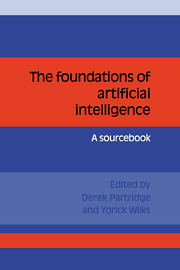Book contents
- Frontmatter
- Contents
- List of contributors
- Preface
- Acknowledgments
- 1 Introduction
- 2 The formal foundations of AI
- 3 Levels of theory
- 4 Programs and theories
- 5 The role of representations
- 6 The role of programs in AI
- 7 Rational reconstruction as an AI methodology
- 8 Is AI special in regard to its methodology?
- Is there anything special about AI?
- What sort of a thing is an AI experiment?
- We need better standards for AI research
- 9 Does connectionism provide a new paradigm for AI?
- 10 The role of correctness in AI
- 11 Limitations on current AI technology
- 12 Annotated bibliography on the foundations of AI
- Index of names
Is there anything special about AI?
Published online by Cambridge University Press: 03 May 2010
- Frontmatter
- Contents
- List of contributors
- Preface
- Acknowledgments
- 1 Introduction
- 2 The formal foundations of AI
- 3 Levels of theory
- 4 Programs and theories
- 5 The role of representations
- 6 The role of programs in AI
- 7 Rational reconstruction as an AI methodology
- 8 Is AI special in regard to its methodology?
- Is there anything special about AI?
- What sort of a thing is an AI experiment?
- We need better standards for AI research
- 9 Does connectionism provide a new paradigm for AI?
- 10 The role of correctness in AI
- 11 Limitations on current AI technology
- 12 Annotated bibliography on the foundations of AI
- Index of names
Summary
From the beginning of computing people have been trying to make computers do more and more difficult things. At first these things were difficult in the sense that people could do them but rather tediously and unreliably, like solving lots of simultaneous equations. Then they were things that for practical purposes people could not do at all, like the calculations of theoretical chemistry. Progress was made by:
Throwing more cycles and memory at problems, which has been the leading source of progress at all times;
Algorithmic invention, such as the use of symbolic differentiation in the early fifties to support theoretical chemistry computations;
Better understanding of what a problem was about – a modern example is to abstract problems of distributedness.
Researchers were slightly surprised to find that, when they wanted computers to do things that people find relatively easy, progress was much more difficult. This should perhaps be rephrased a bit. After all, people do not pick up objects in a three-pronged steel gripper, and they do not translate from French to English starting with the text punched on cards. Nor do they see through television cameras or hear through microphones. It was hard to progress with problems that looked as if they were in all material respects like things that people can do fairly easily.
- Type
- Chapter
- Information
- The Foundations of Artificial IntelligenceA Sourcebook, pp. 269 - 273Publisher: Cambridge University PressPrint publication year: 1990
- 1
- Cited by



